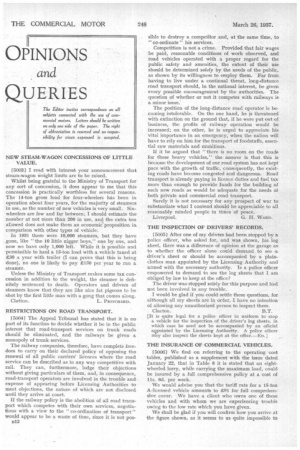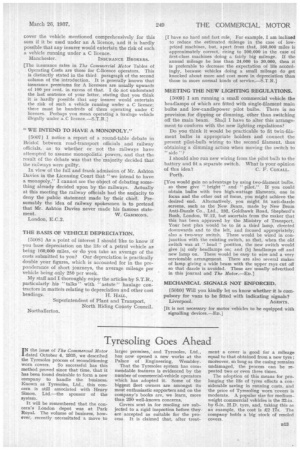OPINIONS
Page 46

Page 47

If you've noticed an error in this article please click here to report it so we can fix it.
and
QUERIES
NEW STEAM-WAGON CONCESSIONS OF LITTLE VALUE.
[5003) I read with interest your announcement that steam-wagon weight limits are to be raised.
Whilst being grateful to the Ministry of Transport for any sort of concession, it does appear to me that this concession is practically worthless for several reasons. The 14-ton gross load for four-wheelers has been in operation about four years, for the majority of steamers in use, as the number of new vehicles is very small. Sixwheelers are few and far between; I should estimate the number at not more than 200 in use, and the extra ton allowed does not make them an economic proposition in comparison with other types of vehicle.
In 1931 there were 10,000 steamers, but they have gone, like "the 10 little nigger boys,one by one, and now we have only 1,000 left. While it is possible and permissible to haul a 13-ton load with a vehicle taxed at £30 a year with trailer (I can prove that this is being done), no one is likely to pay £130 per year to run a steamer.
Unless the Ministry of Transport makes some tax concession in addition to the weight, the steamer is definitely sentenced to death. Operators and drivers of steamers know that they are like nice fat pigeons to be shot by the first little man with a gong that comes along.
Glutton. L. PRITCHARD.
RESTRICTIONS ON ROAD TRANSPORT.
[50041 The Appeal Tribunal has stated that it is no part of its function to decide whether it be in the public interest that road-transport services on trunk roads should be eliminated, and the railways be given a monopoly of trunk services.
The railway companies, therefore, have complete freedom to carry on their declared policy of opposing the renewal of all public carriers' lidences where the road service can be described as in any way competitive with rail. They can, furthermore, lodge their objections without giving particulars of them, and, in consequence, road-transport operators are involved in the trouble and expense of appearing before Licensing Authorities to meet objections, the nature of which are not disclosed until they arrive at court.
lithe railway policy is the abolition of all road transport which competes with their own services, negotiations with a view to the "co-ordination of transport" would appear to be a waste of time, since it is not pos n12 sible to destroy a competitor and, at the same time, to " co-ordinate " his services.
Competition is not a crime. Provided that fair wages be paid, reasonable conditions of work observed, and road vehicles operated with a proper regard for the public safety and amenities, the extent of their use should be determined solely by the needs of the public, as shown by its willingness to employ them. Far from. having to live under a continual threat, long-distance Toad transport should, in the national interest, be given every possible encouragement by the authorities. The question of whether or not it competes with railways is a minor issue.'
The position of the long-distance road operator is becoming intolerable. On the one hand, he is threatened with extinction on the ground that, if he were put out of business, the profits of railway operation would be increased; on the other, h& is urged to appreciate his vital importance in an emergency, when the nation will have to rely on him for the transport of foodstuffs, essential raw materials and Munitions.
If it be argued that "there is no room on the roads for these heavy vehicles," the answer is that this is because the development of our road system has not kept pace with the growth of traffic, consequently, the existing roads have become congested and dangerous. Road transport is already paying in licence duties and fuel tax more than enough to provide funds for the building of such new roads as would be adequate for the needs of both private and commercial road transport.
Surely it is not necessary for any prospect of war to substantiate what I contend should be appreciable to all reasonably minded people in times of peace.
Liverpool. G. H. WARD.
THE INSPECTION OF DRIVERS' RECORDS.
[5005] After one of my drivers had been stopped by a police officer, who asked for, and was shown, his log sheet, there was a difference of opinion at the garage as to whether the officer alone could demand to see -a driver's sheet or should be accompanied by a plainclothes man appointed by the Licensing Authority and armed with the necessary authority. Is a police officer empowered to demand to see the log sheets that I am obliged by law to keep at the office?
The driver was stopped solely for this purpose and had not been involved in any trouble.
I would be glad if you could settle these questions, for although all my sheets are in order, I have no intention of allowing any unauthorized person to inspect them.
Clacton. B.T. • [It is quite legal for a police officer in uniform to stop a vehicle for the inspection of the driver's log sheets, in which case he need not be accompanied by an official avointed by the Licensing Authority. A police officer may also inspect the sheets kept at the office.—En.] THE INSURANCE OF COMMERCIAL VEHICLES.
[5000] We find on referring to the operating cost tables, published as a supplement with the issue dated January 22, that in Table 8 it is stated that an eightwheeled lorry, while carrying the maximum load, could be insured by a full comprehensive policy at a cost of us. 6d. per week.
We would advise you that the tariff rate for a I5-ton A-licensed vehicle amounts to £91 for full comprehensive cover. We have a client who owns one of these vehicles and with whom we are experiencing trouble owing to the low rate which you have given.
We shall be glad if you will confirm how you arrive at the figure shown, as it seems to us quite impossible to cover the vehicle mentioned comprehensively for this sum if it be used under an A licence, and it is hardly possible that any insurer would entertain the risk of such a vehicle running under a C licence.
Manchester. INSURANCE BROKERS.
[The insurance rates in The Commercial Motor Tables of Operating Costs are those for C-licence operators. This is distinctly stated in the third paragraph of the second column of the introduction. It is generally known that insurance premiums for A licensees are usually upwards of 100 per cent, in excess of that. I do not understand the last sentence of your letter, stating that you think it is hardly possible that any insurer would entertain the risk of such a vehicle running under a C licence; there must be hundreds of them operating under C licences, Perhaps you mean operating a haulage vehicle illegally under a.0 licence.—S.T.R.]
"WE INTEND TO HAVE A MONOPOLY."
(50071 I notice a report of a round-table debate in Bristol between road-transport officials and railway officials, as to whether or not the railways have attempted to assume monopolistic powers, and that the result of the debate was that the majority decided that the railways were guilty.
In view of the full and frank admission of Mr. Ashton Davies in the Licensing Court that "we intend to have a monopoly," I cannot see the object of debating something already decided upon by the railways. Actually at this meeting the railway officials had the audacity to deny the public statement made by their chief. Presumably the idea of railway spokesmen is to pretend that Mr. Ashton Davies never made his famous state ment. W. GAMMONS. London, E.C.2.
THE BASIS OF VEHICLE DEPRECIATION.
[50051 As a point of interest I should like to know if you base depreciation on the life of a petrol vehicle as being 160,000 miles, or do you take an average of the costs submitted to you? Our depreciation is practically double your figures, which is accounted for in the preponderance of short journeys, the average mileage per vehicle being only 250 per week.
My staff and I thoroughly enjoy the articles by S.T.R., particularly his " talks " with " astute " haulage contractors in matters relating to depreciation and other cost headings. H. HALL, Superintendent of Plant and Transport, North Riding County Council.
NorthalIerton.
[I have no hard and fast rule. For example, I am inclined to reduce the estimated mileage in the case of lowpriced machines, but, apart from that, 160,000 miles is approximately correct, rising to 200,000 in the case of first-class machines doing a fairly big mileage. If the annual mileage be less than 24,000 to 30,000, then it is preferable to decrease the expectation of life accordingly, because vehicles doing a small mileage do get knocked about more and cost more in depreciation than those in more normal kinds of service.—S.T.R.] MEETING THE NEW LIGHTING REGULATIONS.
[5009] I am running a small commercial vehicle the headlamps of which are fitted with single-filament main bulbs and low-candlepower pilot bulbs. There is no provision for dipping or dimming, other than switching off the main beam. Shall I have to alter this arrangement to conform with the new lighting regulations?
Do you think it would be practicable to fit twin-filament bulbs in appropriate holders and connect the present pilot-bulb wiring to the second filament, thus obtaining a dimming action when moving the switch to "side"?
I should also run new wiring from the pilot bulb to the battery and fit a separate switch. What is your opinion of this idea? C. F. COXALL. Porth.
[You would gain no advantage by using two-filament bulbs, as these give " bright " and "pilot." If you could obtain bulbs with two high-wattage filaments, one in focus and the other out of focus, you might achieve the desired end. Alternatively, you might fit anti-dazzle screens, such as the New. Beam, made by New Beam Anti-Dazzle Co., Ltd., 232, Goldhawk Road, Shepherd's Bush, London, W.12, but ascertain from the maker that this has been approved by the Ministry of Transport. Your best plan would be to fit a third lamp, directed downwards and to the left, and focused appropriately; also a two-way switch. These would be wired in conjunction with the existing switch, so that, when the old switch was at " head " position, the new switch would give (a) only headlamps on; and (b) headlamps off and new lamp on. These would be easy to wire and a very serviceable arrangement. There are also several makes of lamp giving a wide beam with the upper rays cut off so that dazzle is avoided. These are usually advertised in this journal and The Motor.—ED.]
MECHANICAL SIGNALS NOT ENFORCED.
[5010] Will you kindly let us know whether it is compulsory for vans to be fitted with indicating signals?
Liverpool. AGENTS.
[It is not necessary for motor vehicles to he equipped with signalling devices,—En.]




















































































